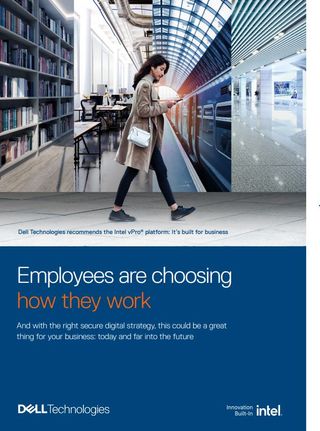How IT professionals can boost their career in the new year
Industry standard qualifications are still in demand, but the modern IT pro needs more than that to get ahead

So, you want to upskill in the new year? Maybe you’re looking for a new role, a different challenge, or you just want to build on your solid foundational skill set? Whatever your motivation, it can be difficult to decide where to start.
According to hiring platform Indeed, some of the most sought after IT certifications include qualifications provided or accredited by Amazon, Cisco, and Microsoft. That’s not the end of the story, though, and recruiters in the IT industry are increasingly clear that expanding your knowledge base goes beyond a few courses.
Not Just About Coding
Orla Daly, chief information officer at international cloud-learning platform Skillsoft, says that there is a high level of need when it comes to areas like cloud computing, cybersecurity, data analytics, artificial intelligence, and machine learning. While she suggests certifications like AWS Certified Solutions Architect and Certified Information Systems Security Professional or CISSP training as possible routes to expanding your career, she also points to so-called power skills as another way of bolstering your CV.
“With digital transformation … IT has an ability to have a larger influence on the business strategy. But with that also comes the expectation that some of our technical resources can move out and can engage in those business conversations and really help drive the overall company strategy,” she says
Daly gives the example of being able to take a large data set and pull conclusions out that fit within more of a governance framework, allowing IT workers to have a say in how companies are “making sure that we stay within the lines or we don’t get ourselves into trouble.” This heavy focus on soft skills is echoed by Melissa McElroy of SPR. She says that once they’ve built their communication talents through channels like books and video content, IT workers can play a “translator” role; helping the technical side of the business speak to marketing, sales, and other business areas.
“Sometimes the business desires and the technology desires can be in conflict,” she says. “So I think being able to navigate those waters, have clear lines of communication, and being able to collaborate to come up with that solution is hugely important.”
Where to Learn These Skills
But how much time do IT workers have to make that change? Kristen Tronsky, chief people officer at cloud reseller DoiT’s, says that part of her workforce spends a considerable amount of its work time just focussing on keeping up with the breakneck speed of the industry.
Get the ITPro. daily newsletter
Receive our latest news, industry updates, featured resources and more. Sign up today to receive our FREE report on AI cyber crime & security - newly updated for 2024.
“If you join our cloud engineering team, you get 30% of your time to just keep pace with the innovation of everything that is evolving so quickly across the multi cloud ecosystem. So we look very specifically for people who have certifications that we know are going to come in heavy use and kind of validate the experience that on a day to day basis they're going to be using.”
She points to certifications and roles like GCP cloud architects, AWS certified solutions cloud architect, Certified Kubernetes Administrator as part of the Cloud Native Computing Foundation (CNCF), and Google’s Cloud Digital Leader as learning opportunities that IT workers can use to set themselves apart. Tronsky also says that her company has a keen interest in using tools that are less tied to certifications like Udemy, A Cloud Guru, Coursera, Whizlabs, and industry white papers to augment their staff’s knowledge base. For her, these training opportunities are even more important as DoIt is a remote-first company.

Employees are choosing how they work
And with the right secure digital strategy, this could be a great thing for your business: today and far into the future
It’s not just your current role that the kind of training you do can affect, however. Aileen Allkins, former corporate VP of global customer service and support at Microsoft who is currently the chief customer officer at technology talent and customer service solutions company Tek Experts, says that beyond courses and certifications, IT staffers should be looking at how they fit within their company and whether their place of work is actively supporting skill development.
“While there are great courses and resources available, my suggestion to individuals would be to look at working at organisations that will invest in their growth and provide learning opportunities for them to grow their skills in alignment with their career goals. This is also an important message for companies – investing in your employees’ growth and building a culture of learning will be the way you thrive in this new digital world.”
McElroy says that at the interview stage is another place where being able to bridge the gap between soft and hard skills can really benefit your career trajectory.
“If someone asks you a scenario question, layering in the approach that you take with the client, layering in how you would communicate, layering in issues that you might see arise from your experience and your background and how you tackle them – I think that you have to answer those questions differently to show off soft skills.”
Where Does That Leave You?
Whether you’re looking to update your resume to get a pay bump, take on new responsibilities at work, or find a new job, it’s clear that both hard and soft or power skills are essential to that upward mobility. Daly says that no matter what training and certifications you choose, ultimately it’s important to keep their origins in mind.
“There is a lot of content out there that isn't necessarily the same level of quality. So, I think it is important to understand where you're getting your certifications and content from.”
John Loeppky is a British-Canadian disabled freelance writer based in Regina, Saskatchewan. His work has appeared for the CBC, FiveThirtyEight, Defector, and a multitude of others. John most often writes about disability, sport, media, technology, and art. His goal in life is to have an entertaining obituary to read.




